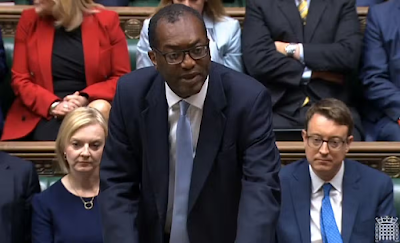The strange good fortune of Britain's unpopulists
IF you want any further proof that right-wing parties play by very different rules you only have to thumb through the contents of today's "mini-budget".
Mini by name, but certainly not in ambition; the £45 billion package of tax cuts is the biggest we've seen since 1972.
The major takeaway is almost all of the headline measures hugely favour big business and the highest earners. Our new PM hasn't even attempted to hide it, rather bizarrely suggesting one of the most unequal countries in Europe has previously paid too much heed to redistribution.
Top rate tax - paid only by those on £150,000 or more - has, in an instant, been axed. The cap on bankers' bonuses has been similarly abolished. Mega corporations like Amazon and British American Tobacco will be asked to pay no more.
We'll leave aside for a minute whether it's democratic that such a drastic vision has been given the green light by a political constituency smaller than the population of the Isle of Wight (fewer than 200,000 Tory members chose our new Prime Minister).
Let's instead look at how the package blows-up the claim that a party can only hope to be successful if they aim to take people with them. If their policy agenda and approach falls firmly within the mainstream opinion, of obvious common sense...
This is why, after all, the supposedly dangerous radicalism of Jeremy Corbyn was so decisively rejected by the electorate in 2019.
If his defeat exemplified a cast-iron rule of politics, what then has emboldened the Conservatives, to adopt an approach which quite obviously turns the dial further in favour of tiny minorities and special interest groups?
It's important to consider the possibility, in the days of polarised opinions and Twitter echo-chambers, that the Truss government has a far greater grip on the nation's pulse than progressives like to admit.
Although a quick glance at the latest Social Attitude Survey, published this week, suggests this isn't the case.
Fifty-two per cent of those polled say they favour tax hikes and better public services, while all of four per cent back hacking taxes and less money for the likes of the NHS and schools.
Given we've just had a summer of stories about patients dying in ambulances and sewage pumping into the sea it's perhaps not surprising that many doubt now is the time for giveaways to those already doing rather well.
Other stats from the same survey show increasing concern about climate change and rising dissatisfaction with the health service, which hardly chimes with ministers opening the floodgates to fracking and offering the bare minimum to an exhausted NHS.
By contrast policies of the left - like taking energy and water companies back into public hands - are endorsed by clear majorities (even among Tory voters).
And yet it hasn't stopped them repeatedly being branded electoral poison by pundits, with front-rank supposedly progressive politicians reinforcing the argument.
Until Corbyn ended the taboo in 2017, it had been more than 20 years since Labour had gone into an election promising significant tax hikes for top earners and widespread nationalisation.
A landslide defeat two years later convinced his successor Keir Starmer to rapidly renege on these policies, sure it was simply too risky to pursue ideological ends, popular or otherwise.
With their announcements today the Tories clearly feel bound by no such constraints, even though their package - if polling is to be believed - is not so much populism as unpopulism.
What this may well indicate is that the reason our "natural party of government" has been in power for most of the past century is not their repeated success in winning some grand battle of ideas but because of various other advantages.
How else can you explain a new administration with the confidence to give hand-outs to the wealthiest during a crippling cost of living crisis? Or to toss a bone to financial speculators at a time when those on the poverty line are being urged to tighten their belts.
The fact remains the Tories enjoy huge financial backing from the rich and privileged and unwavering support from much of the press to amplify their message and distort and smear opponents.
Distractions and downright misrepresentation buy the breathing space to run with priorities which would otherwise be pilloried and win elections where opponents would be doomed to oblivion.
The end result is a party with enough political capital to pursue policies with next to no public backing, which will only ever help a tiny sub-section of society.
Today's fiscal event in someways only builds on the invidious aims of the past 10 years; George Osborne cut business taxes through the worst years of austerity while Rishi Sunak privately boasted of diverting funds from deprived areas to help the Tory shires.
Truss arguably does even less to disguise who will get a payout and who will pay the price. Instead she revives the clapped-out rhetoric of trickle down economics, that when the rich are rewarded we'll all benefit eventually. Whether this audacity will finally bring an end to her party's spell in power, only time will tell...





Comments
Post a Comment